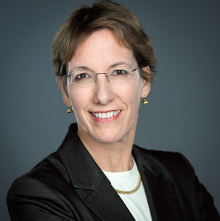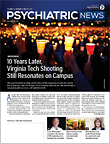White House executive orders barring immigration from certain countries, and a new climate of distrust of immigrants generally, has sown uncertainty among residents from other parts of the world and the directors of their residency training programs, say psychiatric educational leaders.
Though at press time the legal status of the March 6 executive order (EO) barring immigration from six countries was in limbo after being blocked by district courts in Hawaii and Maryland, educational leaders who spoke with Psychiatric News said that the order has fostered unease among residents working in the United States, even those not from the countries directly affected by the EO. (The March 6 order temporarily suspended entry to the United States of foreign nationals from Iran, Libya, Somalia, Sudan, Syria, and Yemen. A previous order on January 27 that was blocked by state courts also included people from Iraq.)
“Concern about entry to the United States for international medical graduates [IMGs], apart from the status of the executive order, has created a lot of uncertainty for trainees and directors,” Consuelo Cagande, M.D., chair of the IMG Caucus for the American Association of Directors of Psychiatric Residency Training (AADPRT), told Psychiatric News. “Trainees who are here in the country face a lot of anxiety about returning to their home countries, for family or other reasons, because they cannot be sure they will be able to return or not be delayed.” She is the psychiatry residency director at Cooper Medical School of Rowan University in Camden, N.J.
The IMG Caucus sponsored a special session on the subject of immigration at AADPRT’s March meeting. During that meeting, Jacob Sperber, M.D., who chaired the special session, delivered a harsh judgment on what he characterized as the arbitrary and capricious nature of immigration enforcement, an unpredictability that preexisted the executive orders and has likely been made worse since.
Sperber’s comments during the session reflected his own opinion, not that of AADPRT.
“The president’s EO creates serious problems of access for immigrant physicians and their families from the countries of origin named in the EO,” said Sperber, vice chair for education and training and the psychiatry residency director at Nassau University Medical Center in East Meadow, N.Y. “Their careers and family lives are at risk for disruption, and so are the training programs that have hired them in the established way. So is the health of the patients their training institutions would care for.”
In comments later to Psychiatric News, he echoed Cagande’s remarks that trainees who return to their country of origin may be delayed when trying to reenter the United States. He said on at least three occasions—prior to the Trump administration—he has had to write to congressional representatives from New York to help expedite the return of trainees who have been held up on reentry to the United States.
APA has joined other medical groups in expressing concern about the situation. A February 8 position statement by the Council on Medical Specialty Societies (CMSS), issued after the first presidential order, was signed by APA and more than 30 other organizations. “Progress against disease will falter if the global community engaging together in medical care is divided by policies that bar members of certain nationalities from entering the United States,” according to the statement. “We call on national leaders to eliminate barriers to scientific exchange and medical education.”
APA Director of Education Tristan Gorrindo, M.D., who participated in the AADPRT session, said psychiatry has historically relied on large numbers of IMG trainees to fill positions, often in underserved areas. In this year’s National Resident Match, 568 of the 1,495 psychiatry slots were filled by graduates of international medical schools.
AADPRT President Sandra DeJong, M.D., said the special session at the AADPRT meeting was instigated by Immediate Past President Art Walaszek, M.D., in response to mounting concerns in the educational community.
“We felt that the executive orders on immigration had put international medical graduates in psychiatry in a uniquely difficult position,” DeJong said. “This was an effort to hear from people in the field in the face of many questions, especially uncertainty among trainees that if they traveled out of the country, they would not be allowed back in.”
DeJong echoed others interviewed by Psychiatric News saying that the executive orders likely had no effect on this year’s match. “There are contractual agreements in place now [between training programs and IMGs who will come to the U.S. for training], so we are hopeful that the trainees who have matched for this year will be allowed to respect those contracts.”
She added, “Institutions will need to rally around and support their IMG trainees and faculty. IMGs tend to be recruited to programs that are underserved and fill a particular niche, often working in underserved areas. It’s a workforce issue, but it is also an issue of well-being for our residents during a stressful period and in the context of concern about physician and trainee wellness generally.”
Shalini Bhutani, Ph.D., assistant vice provost and executive director of the Bechtel International Center at Stanford University, also spoke at the AADPRT meeting about the effect of the executive orders on the wider academic community. The Bechtel Center sponsors foreign nationals seeking to work at Stanford on specialized visas.
In an interview with Psychiatric News, she said processing of some specialized visas has already been affected. For instance, in the past candidates for H1 visas could apply for “premium processing” (at a cost of $1,225) that would ensure faster processing. (Normal processing time for H1 visas is six to nine months; premium processing shortened the period to two to three weeks.)
“Universities could bring people in throughout the year on a timely basis,” she said. “But now premium processing has been suspended for six months. We don’t know how long that will be in effect, but it’s another area where there could be a huge impact.”
Bhutani said that in the atmosphere of heightened suspicion of immigrants, border officials may feel they have license to act with impunity in all sorts of unpredictable ways—for instance, by confiscating laptops or other electronic devices on which travelling physicians may be storing data relevant to research or education.
“It’s the kind of issue that is on the periphery of the large one, which is that the current atmosphere has made racism and discrimination possible,” Bhutani said. “The genie is out of the bottle—I don’t know that we can put it back.” ■
The CMSS position statement on “International Collaboration in Medicine” can be accessed
here.


